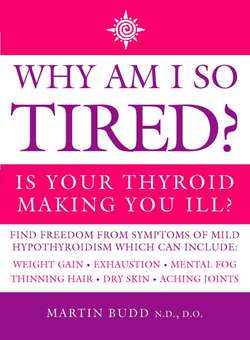Читать книгу Why Am I So Tired?: Is your thyroid making you ill? - Литагент HarperCollins USD, Martin Budd N.D. D.O. - Страница 24
What Happens When you Diet?
ОглавлениеYour body initially interprets dieting as a potential threat to its fuel supply. A need for emergency energy is therefore quickly recognized by the body. This energy is not obtained from fat, as the body is not able to rapidly utilize fat as energy. This role falls to a substance that is rarely discussed in diet books: Glycogen or animal starch. This is the chief carbohydrate reserve in humans, being stored primarily in liver and muscle tissue. Glycogen exists chiefly in solution with water, and our total reserves only amount to approximately 7-8lb. Although its energy value is less than half that of fat, glycogen converts to energy much more rapidly than fat. As a very small amount of energy is required to release water from the body’s cells, dieting and the response to dieting leads to water loss and glycogen loss that is in solution in the water. This phenomena is well known to sportsmen, marathon runners can lose 10 or more pounds in one race. However, athletes prepare for such occurrences by following a very special pre-race diet for six or seven days. This involves a ‘carbohydrate bleeding’ phase for three days, which depletes the stores of glycogen by eating mainly protein-rich foods. This is then followed by three days of high carbohydrate eating, which serves to provide maximum starch reserves to be utilized during the race.
The rapid glycogen draining that occurs with many diets (particularly the low starch diets), coupled with the water loss, has two effects that can be very disturbing to the dieter:
1 A loss of glycogen can lower the body’s blood sugar levels. This hypoglycaemia can cause fatigue, mood changes, dizziness and even faintness. Glucose is the main fuel for the nervous system. The brain, unlike our muscles, does not have a glucose reserve, so it is not surprising that many dieters experience depression, fatigue and mood changes.
2 Low levels of glycogen can trigger hunger pangs. Carbohydrate foods supply the glycogen stores and raise the blood sugar, providing us with a feeling of fullness and contentment. A high protein, low carbohydrate diet can cause a dieter to become ravenously hungry. Strict diets often lead to food craving.
Geoffrey Cannon has written:
In our minds we know the difference between going on a diet and being subjected to famine or starvation. But our bodies do not know the difference. When we go on a diet regime we activate the mechanisms in the body that protect us and preserves us in times of famine. And what does the body need to keep it going between times of famine? — Fat. The more often people diet, the more their bodies will protect the stores of fat. 1
When discussing water loss in the context of dieting, it is worth noting that over 50 per cent of our weight consists of water.
Body fat contains very little water. For this reason women’s bodies contain less water than men’s. This is because the average woman has more body fat than the average man. Consequently an overweight person will hold less water than a lean person of similar weight. The proportion of water, fat and fat-free tissue lost with dieting varies from person to person according to their sex and the diet they followed.
